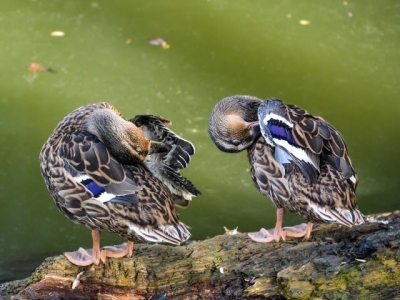Single vaccine developed for avian flu and duck enteritis

UK, 28 March 2018 - The Pirbright institute has developed a single vaccine for both avian flu and duck enteritis
For the first time, researchers led by Professor Munir Iqbal at The Pirbright Institute have been able to insert protective avian influenza virus genes into the duck enteritis virus (DEV) vaccine by using a method of CRISPR/Cas9 gene editing that allows higher rates of gene insertion. This makes the process more efficient and the resulting vaccine virus is able to protect ducks against both DEV and avian influenza.
Duck enteritis virus infects ducks, geese and swans, causing mortality rates of up to 100%. Vaccines are widely used to reduce the impact of DEV, and have recently been utilised for delivering vaccine components of other viruses such as avian influenza. Domestic duck populations in southeast Asia also play a key role in maintaining the reservoir of severe bird flu strains and allow infection to ‘spillover’ into chickens, making ducks important targets for vaccination campaigns.
As with human flu, bird flu vaccination is complicated by the hundreds of potential strains, with seasonal variations determining which vaccine should be used. The gene editing technique, described in Viruses, enables the rapid generation of vaccines that can protect against DEV whilst keeping up with the changing circulating flu strains.
Professor Munir Iqbal, leader of the Avian Influenza group, said: “This is the first time this CRISPR/Cas9 method has been applied to duck enteritis virus and is an exciting step forward in the rapid development of bird flu vaccines. Vaccines that protect ducks against DEV as well as severe forms of avian flu will reduce production losses for duck farmers, safeguard other poultry species against flu infection and lower the risk of transmission to humans.”
DEV is increasingly being used to deliver protective genes to birds due to its large genome size, making it easy to manipulate. The method’s design allows its application to different genes and viruses, opening up the possibility that other diseases can be tackled rapidly using this system.
The vaccine is now ready for registration, and collaborations with pharmaceutical companies are being sought in order for the vaccine to be commercialised. The potential for avian flu to mutate in such a way that makes human-to-human transmission possible is of increasing concern, so vaccinating ducks is an essential strategy for protecting both birds and humans from infection.
As reported by the Pirbright Institute
Related news
 Effects of free-ranging on meat taste in slow-growing birds
Effects of free-ranging on meat taste in slow-growing birds Studies have shown that when buying chicken meat, product attributes such as healthiness, quality and taste are as important as welfare.
 Layers protected by lasers
Layers protected by lasers Poultry farmers all around the world go to great lengths to protect their birds from avian influenza. In many countries there are mandatory
 Salmonella biofilms resist disinfectants in poultry processing
Salmonella biofilms resist disinfectants in poultry processing Salmonella biofilms aren’t as pathogenic as free-floating Salmonella particles but, nevertheless, are significant contributors to contamination in food